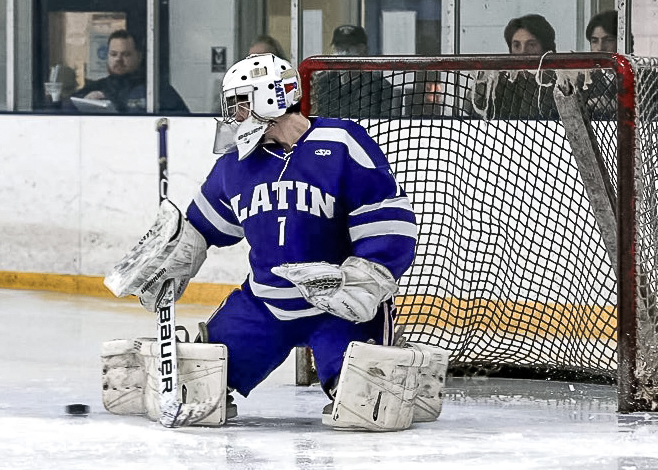Goalies Give It Their All
When you ask sports fans who their favorite players are, the answers are typically the top scorers, playmakers or defenders. But what about the goalkeepers? What about these crucial players, the final line of defense, that can drastically influence the outcome of a game?
It is easy to overlook the contributions that goalies make, yet their significance should not go unnoticed. Goalies in major sports like hockey, soccer and lacrosse protect their team’s goal when all else fails. Even so, not everyone understands just how vital these players are.
“I think with goalies, accomplishments are usually seen and recognized by teammates and coaches. […] But to spectators who do not know the sport that well, accomplishments and well-played games are often overlooked,” says Boston Latin School boys’ varsity hockey team goalie Aidan Fitzgerald (I). It can be discouraging since players draw much of their energy not just from the support of their teammates, but also from the cheers of the crowd.
While these crucial players can be underappreciated by fans, their team is always their biggest supporter. Win or lose, after a period, half or game, teammates will traditionally rush to their goalie to recognize and thank them for their efforts.
Since goalies largely start their sports career as field players, a huge sacrifice is made on their part. These players often do not want the role or are coerced into committing to the “undesirable” position. Student-athletes including Fitzgerald, Valerie Dam-Nguyen (III) and Caitlin McDonough (III) all state that they came to tryouts wanting different positions. After no one else was willing to play goalie, however, they decided to take on the position.
Fitzgerald says, “[I] only switched to being a goalie because the other goalie on [my] team hated the position so much, so [I] decided [I] would play.” For the girls’ varsity soccer team goalie Dam-Nguyen, they “chose to be a goalie because [their] team needed one.” While many players will try the goalkeeper position at least once during their sports career, few decide to commit to the position, as many find field positions more exhilarating.
With this in mind, players that choose to stay in goal are motivated by external reasons. McDonough explains, “It’s so awesome when someone is confident that they’re going to score but then you stop their shot. […] It makes you feel good about yourself, and it gives me more confidence.” Other reasons provided by goalies include the attention, the fun that the high pressure brings and the independence from having a separate role than everyone else.
While goalies do not move as much as field players, being a goalie is still no easy feat. They must be on constant alert to stop any dangerous plays. According to McDonough, to improve their chances of saving the ball or puck, goalies must train their reflexes and agility by doing reaction drills.
Fitzgerald provides further insight: “A lot of the training that comes with being a goalie has to do with agility and hand-eye coordination. Stretching your legs is extremely important as a goalie, as being flexible and agile helps a ton.” Many serious goalies also demonstrate their commitment by training in the offseason, putting their dedication on display. Substantial mental toughness is also required to counter the fast-moving balls or pucks that will frequently fly at them.
There are goalies in different sports from all around the world, but no matter their differences, most of them share common characteristics — they have received less recognition, are reluctant to play the position at the high school level and possess immense skill. So the next time you are asked about your favorite player, don’t forget about the goalies! The game cannot go on without them.






